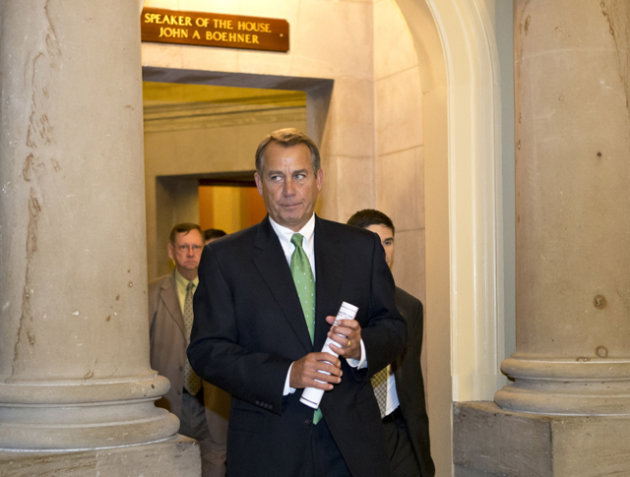LOS ANGELES (AP) — The James Bond blockbuster "Skyfall" has risen back to the No. 1 spot at the weekend box office, taking in $10.8 million.
That brought its domestic total to $261.4 million and its worldwide haul to a franchise record of $918 million.
The top 20 movies at U.S. and Canadian theaters Friday through Sunday, followed by distribution studio, gross, number of theater locations, average receipts per location, total gross and number of weeks in release, as compiled Monday by Hollywood.com are:
1. "Skyfall," Sony, $10,780,201, 3,401 locations, $3,170 average, $261,400,281, five weeks.
2. "Rise of the Guardians," Paramount, $10,400,618, 3,639 locations, $2,858 average, $61,774,192, three weeks.
3. "The Twilight Saga: Breaking Dawn — Part 2," Summit, $9,156,265, 3,646 locations, $2,511 average, $268,691,029, four weeks.
4. "Lincoln," $8,916,813, 2,014 locations, $4,427 average, $97,137,447, five weeks.
5. "Life of Pi," Fox, $8,330,764, 2,946 locations, $2,828 average, $60,948,293, three weeks.
6. "Playing For Keeps," FilmDistrict, $5,750,288, 2,837 locations, $2,027 average, $5,750,288, one week.
7. "Wreck-It Ralph," Disney, $4,859,368, 2,746 locations, $1,770 average, $164,402,934, six weeks.
8. "Red Dawn," FilmDistrict, $4,236,105, 2,754 locations, $1,538 average, $37,240,920, three weeks.
9. "Flight," Paramount, $3,130,305, 2,431 locations, $1,288 average, $86,202,541, six weeks.
10. "Killing Them Softly," Weinstein Co., $2,806,901, 2,424 locations, $1,158 average, $11,830,638, two weeks.
11. "Silver Linings Playbook," Weinstein Co., $2,171,665, 371 locations, $5,854 average, $13,964,405, four weeks.
12. "Anna Karenina," Focus, $1,544,859, 422 locations, $3,661 average, $6,603,042, four weeks.
13. "The Collection," LD Entertainment, $1,487,655, 1,403 locations, $1,060 average, $5,455,328, two weeks.
14. "Argo," Warner Bros., $1,482,346, 944 locations, $1,570 average, $103,160,015, nine weeks.
15. "End of Watch," Open Road Films, $751,623, 1,259 locations, $597 average, $39,989,766, 12 weeks.
16. "Hitchcock," Fox Searchlight, $712,544, 181 locations, $3,937 average, $1,661,670, three weeks.
17. "Talaash," Reliance Big Pictures, $449,195, 161 locations, $2,790 average, $2,397,909, two weeks.
18. "Taken 2," Fox, $387,227, 430 locations, $901 average, $137,700,304, 10 weeks.
19. "Pitch Perfect," Universal, $305,765, 387 locations, $790 average, $63,517,408, 11 weeks.
20. "The Sessions," Fox, $218,973, 197 locations, $1,112 average, $4,948,342, eight weeks.
___
Online:
http://www.hollywood.com
___
Universal and Focus are owned by NBC Universal, a unit of Comcast Corp.; Sony, Columbia, Sony Screen Gems and Sony Pictures Classics are units of Sony Corp.; Paramount is owned by Viacom Inc.; Disney, Pixar and Marvel are owned by The Walt Disney Co.; Miramax is owned by Filmyard Holdings LLC; 20th Century Fox and Fox Searchlight are owned by News Corp.; Warner Bros. and New Line are units of Time Warner Inc.; MGM is owned by a group of former creditors including Highland Capital, Anchorage Advisors and Carl Icahn; Lionsgate is owned by Lions Gate Entertainment Corp.; IFC is owned by AMC Networks Inc.; Rogue is owned by Relativity Media LLC.











